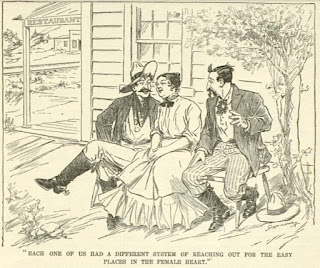BIOGRAPHY
Sherwood Anderson was born in 1876 in Camden, Ohio.
He was the third of seven children. His mother died in
1895 and his father had started to disappear for weeks, and Sherwood took a
number of jobs to support his family. Anderson's talent for selling was evident,
he was very successful in this type of business.
In 1898, he signed up for the United States Army, and his
company was sent to the war in Cuba. He met Cornelia Pratt, the daughter of a
wealthy Ohio businessman, they were married and had three children, and he ran
a number of businesses.
In November 1912, Anderson had a mental breakdown, he
left his wife and their three children and decided to become a creative writer.
He divorced Cornelia in 1916; later he got married to Mitchel, they divorced,
and he got married again to Elizabeth; they divorced in 1932 he got married
again to Eleanor Copenhaver.
In 1916, Anderson's first book, Windy Mc Pherson's
Son, was released in 1916, and Anderson's most famous book, Winesburg,
Ohio, was released in 1919. In 1923, Anderson published Many Marriages,
where he explored the new sexual freedom. Dark Laughter appeared in 1925,
and it was his only bestseller.
Anderson died in Panama in 1941 during a cruise to
South America. He was buried in Marion, Virginia. The writing on his gravestone
reads "Life, Not Death, is the Great Adventure".
ANALYSIS
In Beckersville, county of Kentucky, there lived a 15-year-old
boy, who loved race horses. He sensed that a horse was going to win the race because,
when he noticed it, it was difficult for him to swallow and his throat hurt. He
was so excited about the horse racing environment, that every morning he
would go to Ed Becker's stable to watch the horses training.
At the time of horse racing in Beckersville they only
talked about horses, new foals, jockeys, races in Lexington, Louisville, Saratoga, etc...
This boy and three friends ran away from home to watch
the great Mulford Handicap horse race in Saratoga.
In this race, the Sunstreak horse ran; it was one of
those horses that caused a sore throat to the boy from Beckersville and was trained
and ridden by Jerry Tillfort, a rider whom the boy admired for how well he
treated the horse and how professional he was.
As expected, Sunstreak won the race. At night, the boy
followed Jerry Tillford and his drunken friends to a farm where there were women
with a bad reputation. There he saw his idol Tillford kissing one of them and saying
that the race had been won by him and not by the horse.
So, the boy asks himself the question "I Want to
Know Why" a man so good at horses could kiss a woman so bad.
I really liked the description
-first, of the hobby, enthusiasm and delusion for a
certain event or job.
-second, of an important event that takes place in a
certain location,
QUESTIONS
Nigger is an offensive word. So, what do you call a person who is black?
What do you call foreign people?
What are black people good at (according to the
story)? What a black person (nigger in the story) would do and what
wouldn’t he do?
Describe Bildad Johnson.
Do you know more clichés about black people or about
different social groups?
“I wish I was a nigger”. Did you ever wish to be
another person or to have another nationality or belong to another social
group?
How far is Beckersville from Saratoga Springs? Explain
their trip.
Talk about these characters:
--The protagonist
--The protagonist’s father
--Henry Rieback
--Henry Rieback’s father
Harry Hellinfinger’s jokes: can you explain them?
How does the narrator know when a horse is going to
win? Do you have this kind of intuition for something, or do you know anybody
who does?
Who’s Jerry Tillford?
What is the best smell in the world, according to the
narrator? And for you?
Tell us about Sunstreak.
Describe the rummy looking farmhouse.
What happened when Jerry and his friends arrived at
the rummy farmhouse? And when they were inside the house?
What do the protagonist and Jerry have in common?
What do you think or do when a person you hate (or you
don’t like) love the same things as you? What are your feelings?
VOCABULARY
freight train, (race) track, nigger, scratch around, wheedle,
colt, outfit, livery barn, lay low, cut out, be nabbed, squeal, give you away, gambler,
sheet writer, faro, thoroughbred, gimlet, stunted, spunk, gobble, lit out, plow,
gelding, Sam Hill, post, sire, itch, jawed, paddock, bugle, untrack, stallion, plunk,
skin, rummy, fantods, homely, brag,




